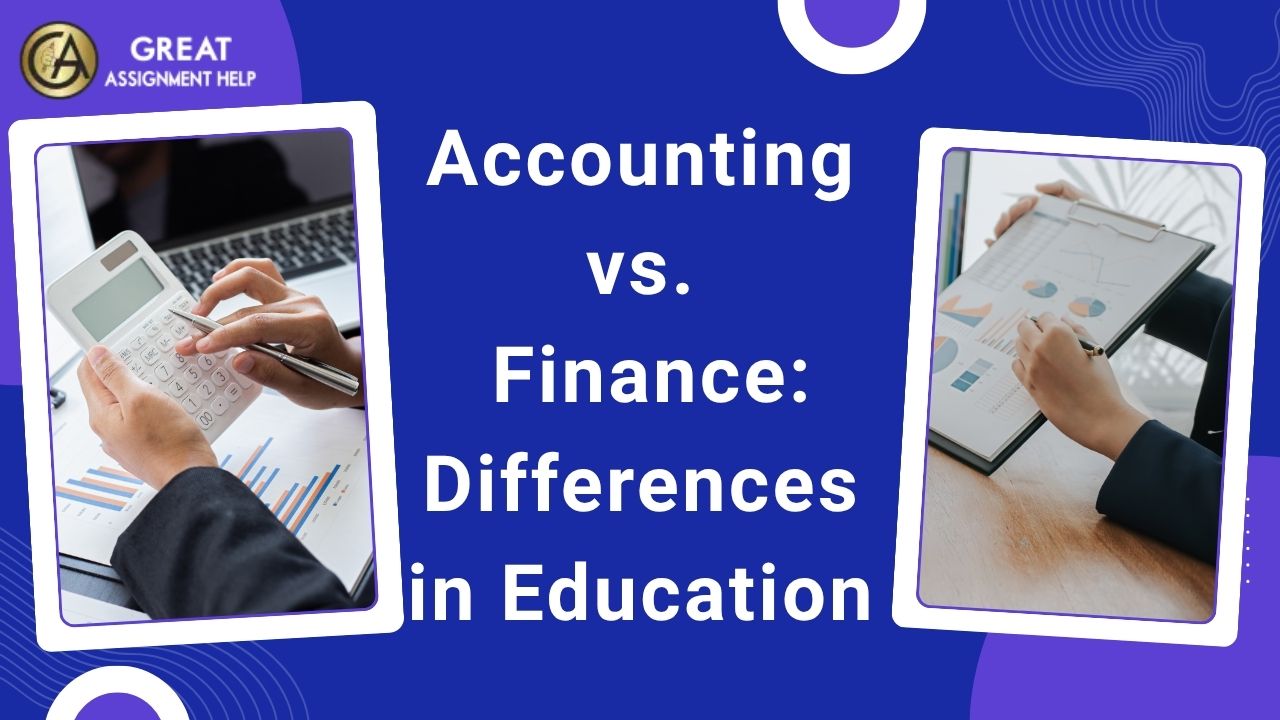Understanding the differences between accounting vs. finance can help you choose the right career path. Accounting focuses on tracking, reporting, and managing financial records, while finance deals with managing money, investments, and financial planning. Both fields require strong analytical and math skills, but they lead to different types of roles and career opportunities.
Choosing the right degree is a big decision for any student, especially when deciding between accounting and finance. These two fields may seem similar, but they are actually different in what they focus on, how they are used, and the careers they lead to. If you enjoy working with numbers or want to understand how money moves in businesses and the economy, then before applying for a degree, understand the similarities and differences between accounting and finance courses. Especially, to help you figure out which path might be right for you, here, we have presented the comparison of accounting vs. finance degrees. Read this blog and understand all about what accounting and finance are, along with their career opportunities and salaries.
What is Accounting?
Accounting is the step-by-step process of keeping track of a company’s money. It involves recording, organizing, and reviewing financial transactions. Accounting helps businesses keep accurate records, follow legal rules, and make smart money decisions.
There are different types of accounting, like financial accounting, tax accounting, auditing, and managerial accounting. When you study accounting, you learn how to read financial reports, understand tax rules, and work with systems like GAAP (Generally Accepted Accounting Principles). With an accounting degree, you can become a CPA (Certified Public Accountant), an auditor, a tax advisor, or even a company controller.
What is Finance?
Finance is mainly about managing money, planning for the future, and helping people or businesses grow their wealth. Finance professionals make smart decisions about where to invest money, how to handle risks, and how to improve financial performance.
There are different areas of finance, such as corporate finance, personal finance, public finance, and investment banking. When you study finance, you learn about topics like how to analyze investments, build financial models, understand markets, and manage risks. With a finance degree, you can work as a financial analyst, investment banker, financial planner, or portfolio manager.
Similarities between Accounting and Finance Degree Programs
Even though accounting and finance focus on different things, they are built on similar basics. Both fields need good math skills, strong analytical thinking, and an understanding of how financial systems work.
At the beginning of both degree programs, students usually take many of the same core classes, such as:
- Introduction to Financial Accounting
- Micro and macroeconomics
- Business law
- Statistics
- Corporate finance
Also, both degrees will help you build skills in analysis, problem-solving, and making ethical decisions. Since the coursework can be challenging, many students also look for extra support through services like Accounting Assignment Help or Finance Assignment Help.
Accounting vs. Finance: Differences in Education

As you move further into your degree program, you will start to see the differences between accounting and finance more clearly. Here, let us look at the variations in the curriculum of both accounting and finance degree programs
Accounting Degree Curriculum
- Cost Accounting
- Auditing and Assurance
- Taxation
- Financial Reporting
- Ethics in Accounting
- Accounting Information Systems
Finance Degree Curriculum
- Financial Markets and Institutions
- Investments and Securities
- Corporate Finance
- Risk Management
- Financial Derivatives
- Behavioral Finance
The accounting curriculum will focus more on rules, accuracy, and how to prepare financial reports correctly. The course will ensure that everything follows the proper standards and regulations. On the other hand, in finance, the focus will be more on planning for the future, making decisions, and creating strategies, especially when things are uncertain or risky.
Accounting vs. Finance: Salary and Career Opportunities
Both accounting and finance degrees offer good job chances and salaries, but they lead to different kinds of careers.
Accounting Careers
- Accountant: Median salary of $78,000
- Auditor: $75,000
- CPA: $85,000–$100,000
- Tax Advisor: $70,000
Finance Careers
- Financial Analyst: $85,000
- Investment Banker: $100,000–$150,000
- Financial Planner: $75,000
- Portfolio Manager: $100,000
Jobs in finance, like investment banking or working at hedge funds, usually pay more money. However, these jobs often require longer hours and can be more stressful. On the other hand, accounting jobs usually have more regular hours and offer a more stable work-life balance. They are often a good choice if you want steady, long-term work in a company.
Skill Sets
Both finance and accounting degrees will help you develop different skills. However, some skills are shared between the two fields.
Accounting Skills
- Attention to detail
- Organizational skills
- Strong ethics and integrity
- Familiarity with accounting software (e.g., QuickBooks, SAP)
- Knowledge of regulatory frameworks
Finance Skills
- Quantitative and analytical thinking
- Strategic decision-making
- Strong communication and presentation skills
- Financial modeling and forecasting
- Risk assessment
Accounting vs. Finance: Which Degree is the Best?
There is no one best degree. It completely depends on your interests, career goals, and the way you prefer to work.
Choose accounting if you like working with financial reports and making sure data is accurate. This course is a good fit in case you prefer organized and structured work settings. Moreover, when you are interested in things like tax laws or checking financial records, you can apply for an accounting degree. It is also the path to take if you want to become a Certified Public Accountant (CPA).
Finance is a great choice when you enjoy analyzing market trends and understanding how the economy works. You will do well in this field if you thrive in fast-paced, high-pressure situations. This path can lead you to careers in investment banking or financial consulting. Also, the finance degree is ideal if you wish to grow wealth and manage investment portfolios.
You can also combine the strengths of both accounting and finance. Some students choose to study both by doing a double major, while others start in one area and switch to the other later. For example, many financial analysts begin with an accounting background, and some CPAs move into financial consulting as their careers grow.
Accounting vs. Finance: How to Choose the Best Degree
If you are having a hard time deciding between accounting and finance, here are a few simple points to think about:
- Career Goals: Think about the kind of work you enjoy. Accounting often involves preparing financial reports and tracking company performance, while finance focuses more on investments, budgeting, and financial planning.
- Learning Preferences: Accounting focuses on clear rules and set processes, while finance involves more analysis, forecasting, and decision-making in uncertain situations.
- Work Style: Accounting roles usually offer steady, 9-to-5 jobs with routine tasks. Finance roles can be more fast-paced and demanding but may offer higher earning potential.
- Certifications: Many jobs in these fields require extra certifications, such as a CPA for accounting or a CFA and CFP for finance.
- Course Difficulty: Both programs can be tough in different ways. However, when you struggle to handle your coursework, you can use services like Pay Someone to Take My Online Accounting Class, but building real understanding is essential for future success.
Conclusion
Accounting and finance are both well-respected degrees that lead to strong career opportunities. However, the best choice depends on your personality, future career plans, and how you prefer to work with money and business. Usually, accounting suits those who prefer structure and accuracy. But finance is ideal for those drawn to strategy and risk. But to start a career in these fields, you must finish your degree. While you pursue a course in finance or accounting, you will often be asked to submit different assignments. In case you struggle to handle your work on finance or assignment topics, utilize our Assignment Help services. The accounting and finance experts from our team will guide you in completing your assignments, enhancing your subject knowledge, and boosting your grades.



